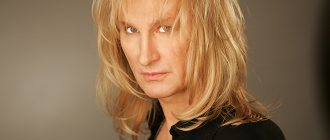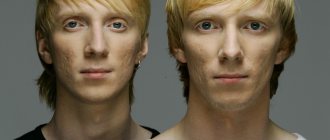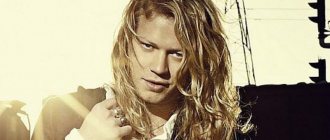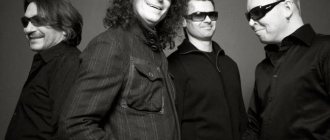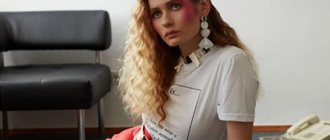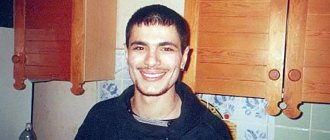Biography
Yuri Shevchuk was born in a small village in the Magadan region into a Ukrainian-Tatar family. His father, Yulian Sosfenovich, was from the Khmelnitsky region of Ukraine, his mother, Fania Akramovna, was of Tatar blood and in her maiden name was Gareeva.
As a child, the future rocker was fond of drawing. In 1964, the Shevchuk family moved to Nalchik, where the boy went to school and, in parallel with his studies, began taking private music lessons.
In 1970 there was another move - to Ufa. Here Yura continued to improve his skills in the art studio at the local House of Pioneers and in the school ensemble "Vector". He independently learned to play musical instruments - he mastered the button accordion and guitar, and his drawings repeatedly received awards at various competitions.
While in eighth grade, Shevchuk drew a crucifix on his T-shirt and wrote “Jesus was a hippie.” While walking around the city in this T-shirt, he was detained by the police.
In 1975, Yuri Shevchuk graduated from school and entered the art and graphic department of the Bashkir State Pedagogical Institute. During his studies, he took an active part in the creation of the student theater and became increasingly interested in music, in particular, rock and roll, which had just become fashionable.
Having received an artist's diploma, Shevchuk was assigned to a rural school in the Bashkir village of Iglino. There he taught children drawing and at the same time played in the groups “Free Wind” and “Kaleidoscope”. As a musician, he performed at school parties and holidays in cultural centers. For his first musical experiments he received a prize at an art song competition. At the same time, Shevchuk faced the first criticism from the authorities for the predominance of rock and roll rhythms in his group’s repertoire, which in the late 70s was recognized as an alien phenomenon in Soviet culture.
At the end of 1979, on the recommendation of a mutual friend, Shevchuk was invited to an unnamed group that rehearsed in the Ufa Palace of Culture "Avangard". So, in 1980, a rock group appeared, which would soon become known as “DDT”. By this time, Yuri was writing poems and performing them with a guitar. Musicians began performing at student evenings, in restaurants, cinemas and cultural centers - in almost any available venue. They even managed to record their first magnetic album of seven songs, known today as “DDT-1”.
A little later, in the early 80s, Yuri Shevchuk met religious dissident Boris Razeev, who gave him the Gospel and banned books by Solzhenitsyn and Orwell to read. In 1982, the musician came to the city of Gorky to meet with Andrei Sakharov, who was in exile there, but he was not allowed to go to Sakharov’s house.
At the same time, the Komsomolskaya Pravda newspaper announced the first all-Union competition “Golden Tuning Fork”, in which groups from all over the country took part, sending their entries. Shevchuk and his musicians went through the first tour, and then the need for an official name for the group arose. The group was presented as "DDT" and became the winner of this competition with the song "Don't Shoot."
History of creation
Ufa, 1980.
Somewhere in Moscow the Olympics are thundering, the first rock festival in the history of the USSR “Spring Rhythms” is taking place in Tbilisi, and in the city on the Belaya River a newly born band, later named DDT, is gaining strength. It all started when the poet and singer-songwriter Yuri Shevchuk was invited to join the rhythm and blues cover band “Kaleidoscope,” which performed at the local House of Culture. He, a born leader, became a successful addition to guitarist Rustam Asambaev, drummer Rinat Shamsutdinov (later Boris Pasternakov and Rustem Karimov played the drums), keyboardist Vladimir Sigachev and bassist Gennady Rodin.
Group "Kaleidoscope"
Soon the bassist came across an advertisement for entry into the all-Union music competition “Golden Tuning Fork”. The prize they promised was simply incredible - a free recording of a record on the state Melodiya label. The guys, in makeshift conditions, recorded two of their own songs with words by Shevchuk (Black Sun" and "Don't Shoot!") and a cover of "Everything as before" by Yuri Antonov and sent the reel to the address indicated in the newspaper.
Young Yuri Shevchuk before the DDT group
Something about the aspiring musicians caught the jury’s attention, and DDT advanced to the second round. To participate in the next stage, a higher-quality recording was required, and the musicians, with the support of Bashkir Television, recorded their debut album in the winter of 1981 under semi-legal conditions. The album includes 9 songs, including the anti-war “Don’t Shoot!”, dedicated to Soviet soldiers who did not return from Afghanistan, as well as “Black Sun”, “On the Quiet”, “Alien”, etc. The group’s repertoire was in the stage of searching for creative self-expression: here there was hard rock, rock and roll, ballads, blues compositions, and folk intonations...
In 1982, DDT’s second album, “Pig on the Rainbow,” was released.
After this, there was a lull in the group, mainly associated with Shevchuk’s defense of his diploma (he was studying to become an art teacher) and assignment to a rural school. In April 1982, Yuri returned to his hometown and took the position of director of amateur performances at the local cultural center. DDT resumed rehearsals, soon gave a concert for Ufa fans and then recorded their second album, “Pig on the Rainbow,” under semi-legal conditions.
Cover of "Pigs on a Rainbow"
As it turned out later, the “pig” meant Leonid Brezhnev. The song of the same name immediately became banned, and the group received an unspoken veto on concerts until Perestroika. They talked with Shevchuk at the KGB, where, by the way, they immediately guessed who was hiding behind the “pig” allegory.
In 1982, it turned out that DDT made it to the finals of the Golden Tuning Fork. But due to a bureaucratic error, only Shevchuk received the right to perform at the competition, which was subsequently shown on television. He sang several songs, including “Don’t Shoot!”, which brought the musician the main prize of the competition. But in order to record it in the studio, it was also necessary to perform several songs by Soviet composers from the “blank sheet”. Shevchuk refused, and the group actually went underground.
Music
At the beginning of 1983, DDT recorded the acoustic album “I’m leaving” in the radio center of the Ufa recreation center “Neftyanik”. After which Shevchuk went to Cherepovets and recorded an album at the studio of the local group “Rock-September”, which was called “Compromise”. The recordings quickly spread throughout the country, for the first time putting the name “DDT” and Shevchuk on the same level as the “stars” of the Leningrad rock club.
After the release of the album “Periphery” in 1984, in which Shevchuk painted a not particularly attractive picture of life in the outback, relations with the authorities deteriorated again. The group’s concerts began to be banned, Shevchuk himself was summoned to the local branches of the KGB of the USSR and the Komsomol. Then the musicians were banned from recording in studios, and Yuri was expelled from the Komsomol.
After this, the team moved to Sverdlovsk. Yuri Shevchuk played in the Urfin Juice group, but not for long; he soon had to leave there too. In March 1985, DDT musicians played at a semi-legal concert in Auditorium 6 of the Leningrad Veterinary Institute; the miraculously preserved recording of this concert was published in 1995 under the title “Stoker”.
In 1985, Shevchuk often performed in Moscow, but mainly at “apartment” concerts. However, one of these concerts was recorded and later distributed throughout the country as the album “Moscow. Heat".
A little later, Yuri finally moved with his family to Leningrad, where, like many representatives of his generation - young rock musicians and artists, he worked as a janitor, fireman, night watchman and actively wrote songs.
In the spring of 1987, DDT presented its concert program at the 5th Leningrad Rock Festival, where it was recognized as the main discovery. In the summer of 1988, DDT repeated its success at the 6th Rock Club festival and triumphantly toured with concerts throughout the country from the Baltic to Kamchatka. A little later, an album of the best songs “I Got This Role” was recorded for the Leningrad branch.
In the 90s, Yuri Shevchuk and his group “DDT” continued their course, recording new songs and albums - lyrical, philosophical, social. Shevchuk began to conduct more and more concert programs - “Black Dog Petersburg”, “From and to” and others.
On May 20, 1993, in honor of the birthday of St. Petersburg, the group gave an open concert on Palace Square, which was attended by 120 thousand people. That same summer, DDT took part in the international festival “White Nights of St. Petersburg” in Berlin, and in the fall it was awarded the prestigious Ovation music award as the best rock band of the year, while Shevchuk was recognized as the best rock singer of the year.
In general, the 90s became very successful creatively for Yuri Shevchuk. "DDT" recorded several albums: "Thaw" (1990), "Plastun" (1991), "Actress Spring" (1992), "Black Dog Petersburg" (1994), "That's All..." (1994), "Love" (1996), “Born in the USSR” (1997), “World number zero” (1999). The song “What is Autumn” from the album “Actress Spring” was included in the hit parade of the 100 best songs of the 20th century “Our Radio” “All Ours Forever”, taking second place in it.
In addition to tours around the country, Yuri Shevchuk often toured abroad at this time. Germany, USA, Australia, Hungary, France, Japan, England, Canada, Israel, CIS countries - everywhere the concerts were a great success.
In 2000, the 20th anniversary of the DDT group was celebrated with a grand tour. During this period, the following discs were released: “Blizzard” (1999), “Blizzard of August” (2000), a collection of the series “Encyclopedia of Russian Rock” (2000). Later the albums were recorded: “Unity 1, 2” (2002-2003), “Missing” (2005), “Beautiful Love” (2007). Folk singers and wind instruments, uncharacteristic of rock music, were involved in the recording of some songs.
In 2006, Yuri Shevchuk joined the music in the style of Heavy Metal, taking part in the recording of the song “Will and Reason: 20 years later” of the single “Alien” by the group “Aria”.
A year later, the musician became a laureate of the Russian Triumph Prize for outstanding achievements in the field of literature and art. He donated all the funds received from the award to military personnel who suffered during the Chechen wars.
At the end of December 2008, the musician released his solo album “L'Echoppe (Stall)”, recorded a year earlier in Paris.
On August 25, 2010, Yuri Shevchuk performed on the stage of the BSA Luzhniki in a duet with U2 vocalist Bono, performing the song “Knocking on Heaven's Door”.
Around the music
Having become a recognized master of Russian rock music by the mid-90s, Yuri Shevchuk continued to support young bands and performers. Together with his friends, he organized large festivals, to which he invited talented musicians selected by them during tours around the country. The result of the festival was the recording of discs - collections of songs by the best bands on their own DDT label. Thus, young musicians had the opportunity to express themselves to the general public.
Another side of Yuri Shevchuk’s musical activity is the irreconcilable struggle with pop performers performing to a soundtrack. The rocker recorded the songs “Phonographer” and “Pops”, repeatedly spoke critically in interviews on this topic, and there were even physical clashes. So, with the help of fired sound engineer Philip Kirkorov, Shevchuk distributed on the Internet a recording with real sounds that Kirkorov makes to the soundtrack, depicting vocals on stage. The DDT group also took part in the drafting of a bill regulating the use of phonograms in performances.
DDT group now
In March 2020, the rock band presented a video clip for the song “Love is Not Lost.” Around the same time, the recording studio Navigator Records announced the completion of the creative process of DDT’s new album, “Galya, Go.” It was released on June 9 and turned out to be more eclectic than the group's previous records. DDT - Love is not lost The “History of Sound” tour continued with success - a large program in which musicians try to comprehend today together with their listeners. Kaluga, Astana, Far East, Warsaw... May was dedicated to viewers in Germany. The team planned to devote the summer to festivals: Okulovsky - SOLSTICE, Minsk - Rock for Beavers, Tambov - Chernozem.
Movie
Yuri Shevchuk began appearing on movie screens in the late 80s. He has not so many artistic projects to his credit as documentary ones. The musician was a bright character of that difficult era.
Speaking of feature films, in 1990, Yuri Shevchuk starred in the two-part film “Dukhov Day” directed by Sergei Selyanov. He played Ivan Khristoforov. His character, who has the ability to anticipate explosions, gives interviews to journalists. A little later, the gas, which was not turned off by the neighbor, explodes, which was predicted. Then Ivan begins a story about himself. Viewers will learn the story of the hero, the peculiarities of the development of his creative personality, the unique connection with the world around him through the insights inherent in him since childhood.
In 2005, the series “Ataman” was released, in which Yuri Shevchuk tried himself as a cameo. In episode 16, the artist can be recognized as a singer performing his hits in an underground passage. According to the plot of the film, Yuri Voronin, a former professional military man, a paratrooper who went through Afghanistan and other “hot spots,” comes to his homeland, the Don village of Orlikovskaya. After looking around, meeting old friends and first love, he decides to stay home forever. Yuri refuses to go into the service of a local bandit and thereby unexpectedly stands in the way of those who make a fortune by selling weapons, drugs and people. Of course, Voronin decides to fight for justice.
In 2008, in the television melodrama “Father,” Shevchuk played the role of a village doctor. Forty-year-old sailor Roman Malyshev, an eternal wanderer and a convinced bachelor, comes to his native village for a short time for family reasons. Here he takes part in the restoration of the Temple and at the same time another important event occurs in the hero’s life - he falls in love. The restoration of the church is ending, it seems that it is time to return to its former life. But Malyshev delays, keeps postponing his departure and, finally, chooses another solution: he marries his chosen one and takes the priestly rank - becomes a priest.
In Andrei Smirnov’s historical film “Once Upon a Time There Was a Woman,” Shevchuk played Ishin, the commander of a rebel detachment. Work on the film lasted 24 years, only in 2011 the film was released in Russian distribution.
In 2007, Yuri Shevchuk voiced 500 episodes of the project “History of the Russian State”, this is a documentary series created based on the work of the same name by Nikolai Karamzin.
The soundtrack to the acclaimed 2020 film “Coach” by Danila Kozlovsky, which premiered on the eve of the World Cup in Moscow, was Yuri Shevchuk’s song “That’s All.”
2000s
Ivan Vasiliev joined the group . In the same 2000, three new albums were released at once: “Blizzard of August” , “Whistled” and a double album of the best songs of “DDT” released by the Grand company in the “Encyclopedia of Russian Rock” . On August 23, violinist and guitarist of the group Nikita Zaitsev . In the fall, the group begins to prepare a new concert program “20:00”, dedicated to the twentieth anniversary of the group, and presents it on November 1, 2000 at the St. Petersburg Ice Palace. In mid-2001, Grand reissued previously released albums on fifteen CDs, with each album supplemented by rare bonus tracks. In mid-October 2001, DDT began rehearsing a new program and recording a new album with the tentative title “Unity” . On December 3, 2001, the St. Petersburg premiere of “Unity” took place at the Yubileiny Sports Complex and, according to various estimates, gathered from six to seven thousand spectators. At the concert, which lasted more than two hours, both new songs from the album “Unity” and hits from past years were performed. During the performance, Yuri Shevchuk made an announcement that soon, in connection with the start of work on his own project, one of the longest-standing and main members - guitarist Vadim Kurylev , who had already been for some time, in parallel with DDT, was going to leave the group. participated in some other musical projects (one of the most successful is the Sorcerer Oaks). At the premiere of “Unity” in St. Petersburg, Kurylev performed one of his own solo works. This was one of his last concert performances as part of DDT. On December 5, DDT departed for their third American tour, which covered three cities in Canada and four in the United States. In November 2002, the group’s new album “Unity” was released. Part I" . On May 27, 2003, exactly six months after the release of the first part of the album “Unity,” the second part was released. Recording the album “Unity. Part II. Alive" took place in January 2002 in St. Petersburg at the DDT studio. During the recording of the album, guitarist Vadim Kurylev Alexey Fedichev took his place . In April 2005, the DDT group released the album “Missing” and went on a concert tour in support of the album and in honor of its own twenty-fifth anniversary. During the “Missing Person” tour, 47 concerts were given in cities of Russia, Ukraine, Belarus, Germany, Israel and Great Britain. There is a version that the album “Missing” is dedicated to former band member Vladimir Sigachev , about whom nothing has been known since 1993. In 2006, the group began preparing to record their next album and practically stopped their concert activities, performing only on special occasions. On April 19, 2007, a new album of the group called “Beautiful Love” , which is a collection of old and new songs that were performed by Yuri Shevchuk solo, with a guitar, and were not previously released in studio versions, with the exception of some songs. On May 5, 2007, the group gave an acoustic concert on a chamber stage in the House-Museum of Bulat Okudzhava , in which songs from the album were performed, the title track of which Shevchuk performed to Okudzhava during a personal meeting in 1995. In January 2008, DDT performed a series of five concerts in cities in the USA and Canada (Los Angeles, San Francisco, Toronto, Chicago, New York). About 30 songs are performed. The concerts are a resounding success in crowded halls. On March 3, 2008, Yuri Shevchuk made a speech at a protest against the results of the “March of Dissent” elections in St. Petersburg. From April to July, with the information support of the Russian Orthodox Church, the group played a missionary tour of the cities of Ukraine in honor of the 1020th anniversary of the Baptism of Rus'. The Ukrainian bands “Sky” and “The Brothers Karamazov” performed as the opening act for “DDT”, and the famous missionary Deacon Andrey Kuraev read sermons addressed to young fans of the St. Petersburg group. The main concert of the tour was a performance in Kyiv on Spivochy Pole, which attracted more than one hundred thousand spectators. On September 24 and 26, 2008, DDT performed the “Don’t Shoot!” in Moscow and St. Petersburg, respectively. The concerts were dedicated to the victims of local wars of recent decades. Together with DDT, groups from Georgia and South Ossetia, the Brothers Karamazov group, as well as deacon Andrei Kuraev, who delivered a five-minute sermon, performed. Part of the funds raised from the performance was sent to the victims of the military conflict in South Ossetia. These two concerts were the last performances of DDT in 2008, after which the group retired to their St. Petersburg studio to work on a new album. The concert in St. Petersburg was filmed by the St. Petersburg Channel Five and broadcast on November 4, 2008. The concert was not interrupted by advertising.
At the end of December 2008, the musician released his solo album “L'Echoppe (Stall)”, recorded a year earlier in Paris.
In the summer of 2009, Yuri Shevchuk’s book “Solnik” was published.
On June 7, 2009, DDT presented their new program in the Narva Fortress (Estonia) near the Estonian-Russian border.
On June 12, 2009, the group performed at the Rock over the Volga festival in Samara. On June 27, DDT performed at the international music festival “Creation of the World” in Kazan. From the end of August, a tour begins - “testing” new songs - in Russian cities.
On September 2, 2009, the DDT group performed on the All-Russian Exhibition Center square. During the concert, the musicians protested against the destruction of historical buildings in Moscow.
Books
In 1999, the Russian Poetry Foundation publishing house published the first book of poems by Yuri Shevchuk, “Defenders of Troy.” In the introductory note to this publication, the writer, playwright and poet Alexander Volodin wrote: “The poems and songs of Yuri Shevchuk have absorbed a lot in our earthly and heavenly world... Frenzied, piercing, sometimes mischievous lines. And the wise are like life itself.”
In the summer of 2009, Shevchuk’s second book of poems, “Solnik,” was published.
In 2013, in Finland, on the eve of the DDT concerts, a book of Shevchuk’s poems “Joka kevät minä kuolen” (Russian: “I die every spring”) was published.
Social activity
Yuri Shevchuk always reacted sharply to events taking place in Russia, did not stand aside, and gave comments on various social topics.
In 1995, Yuri Shevchuk took a trip to Chechnya. He talked with soldiers in dugouts and shelters, performed acoustic concerts, and came under fire several times. On this trip, Shevchuk made an inherently tragic video where he asks the soldiers to introduce themselves and name their hometown. A few years later it became known that of the two dozen guys immortalized on film, only one returned from the war.
Writer Vyacheslav Mironov in 1997 wrote a book called “I was in this war,” describing the real events that took place on the territory of Chechnya during the hostilities. The author described Shevchuk’s stay on the front line this way: “... In our column, in the fifth car, is the leader or soloist brought from the second battalion, God knows, Yuri Shevchuk of the DDT group. They brought him along with the wounded chief of staff and three other wounded soldiers. This Shevchuk turned out to be a cool guy, everyone expected him to pretend to be a hard-to-get-to-be-star. Not a damn thing, as simple as three kopecks, having spent three days in the basement under fire and counterattacks of spirits along with the second battalion, according to eyewitnesses, he was not hiding. He behaved like a real man, helping the wounded. They didn’t give him a weapon, the devil is blind as a mole, and, God forbid, they’ll catch him. But otherwise a world guy. Allegedly, the spirits were told over the radio station that they had Shevchuk, when they offered to surrender, but they didn’t believe it. They let them listen to him sing, then he talked to them. They offered to take him out and gave guarantees. He refused. And Shevchuk also promised (and, as it later turned out, he did) to send the wounded, and not only from our brigade, at his own expense and at the expense of his friends for treatment in Germany. He bought them prosthetics and wheelchairs and did not make a show of it. There were no reporters, no press conferences, it was quiet and modest. In one word - Man..."
In 1999, Shevchuk visited Yugoslavia with concerts in defense of its integrity and sharply criticized the United States for bombing a sovereign state. For UNESCO, Shevchuk filmed reports about destroyed Orthodox churches in the Serbian region of Kosovo.
Personal life
Yuri Shevchuk's first wife was Elmira Bikbova. In this marriage, a son, Peter, was born in 1987. When the boy was only 4 years old, Elmira was unexpectedly diagnosed with a brain tumor. She “burned out” in a matter of months, leaving Yuri and his little son alone.
The musician raised his son alone. Over time, Peter entered the Kronstadt Naval Cadet Corps and served in the Marine Corps. Now it is known about him that he plays techno under the pseudonym DJ Pete and makes websites and applications for mobile devices.
In September 1997, Shevchuk had another son, from actress Maryana Polteva, who was named Fedor. The couple’s family life did not work out, and soon Maryana moved with her son to Berlin.
In 2009, rumors appeared in the press about Yuri’s affair with actress Chulpan Khamatova. In 2012, Alexander Kott shot a video for the song “Where We Fly,” which Shevchuk recorded together with Khamatova. They also starred together in the video.
Since 2014, when the musician was reproached for his bachelor lifestyle, he said that he was not single, but married. In all interviews he calls his wife exclusively by her first name and patronymic. “Ekaterina Georgievna forbids me to talk about her,” Shevchuk shared. “But I will say that she pampers me, she just feeds me all sorts of goodies - she’s a great cook.” She still thinks that I am not well-fed enough. She wants me to be softer, lighter and kinder. And sometimes I shock my loved ones with some, God forgive me, rudeness. My rear is strong: my wife, my mother, and my sister. And everyone loves me, although I’m still a bastard.”
Interview
Vicious DDT
“It was the fall of ’80. Several songs have already been written for which I was not ashamed... “Don’t shoot”, “Rain”. We decided to call ourselves something... We thought for a long time. Dust - "DDT" - we liked this name. It was a very evil, sharp name for its time, because in those days there were ensembles “Merry Guys”, “Red Mediators”, “Forward to Dawn”... And we deliberately, out of spite, called ourselves so viciously: “DDT”, that is, those who poisons all evil spirits. We were very socially active."
Parasite Shevchuk
“Of course, I had a good time in the 80s. There were interrogations and conversations at the KGB. This was in 1985, just before perestroika. I had to emigrate from Ufa. I was deprived of my job, and the next day I received a summons saying that I was a parasite. I came and said: “Guys, let me at least work as someone.” I'm not a parasite. They offered me a job at an art school, teaching children. I had to get up at 5 am and drive a couple of hundred kilometers. It’s okay, it saved me.”
“The audience is screaming - and we are like tanks”
“A lot of good bands were killed by a super song. Remember EAGLES - Hotel California. And that’s it, no one knows anything else. They are still scratching it... The DDT group could well have been buried with the song "Autumn". The guys and I were really scared then. Well, such a folk song was written, but we are bored of playing it a thousand times. And we didn’t play at all for a whole year, we ground our teeth, but didn’t play. The audience is screaming, and we are like tanks. And they won. I am truly proud of this."
I'm not silent because I love you
“It’s always hard for me to admit this love for the Motherland - it has a Chaadaev character for me. I am not a chauvinist - I am a patriot, but in the Chaadayev sense of the word, that is, I see all the disadvantages and consider it my duty to talk about it, not to hush up what prevents us from living in Russia. I'm trying to be honest and sincere."
Yuri Shevchuk
The parents of the famous rock bard traveled around the country: Magadan, Nalchik, Ufa. Yuri was born in 1957 in the north, began drawing and studying music in the south of Russia, and became famous in the Urals. He graduated from the Bashkir Pedagogical Institute with a degree in graphic design and worked as a teacher in a rural school. At the same time, he played in two groups - “Kaleidoscope” and “Free Wind”, and became a prize-winner of an art song competition.
Yuri's early work was inspired by Galich, Okudzhava and Vysotsky. The poetry of the Silver Age - Yesenin and Mandelstam - is also close to him. The themes of preserving morality, citizenship and patriotism become central to his lyrics.
Since 1985, he has lived in Leningrad, where he assembled a new line-up of DDT, became a member of the city rock club and began to play music professionally.
Awards and prizes
Yuri Shevchuk was awarded:
- Medal of the Ministry of Emergency Situations of Russia “Participant in emergency humanitarian operations”
- Insignia of the Ministry of Internal Affairs "Silver Cross"
- Award badge “Participant in combat operations in Chechnya”
- Medal "For Military Valor" of the All-Russian Military Organization "Combat Brotherhood"
- Badge "Master", international arts festival "MASTER CLASS"
- The title “Best Rock Singer of the Year”, the festival “White Nights of St. Petersburg”, held in Berlin in 1994
- Order of the Ukrainian Orthodox Church of St. Andrew the First-Called Apostle (2012)
- On January 16, 2010, a diploma was awarded naming asteroid No. 212924 Yuri Shevchuk.
Yuri Shevchuk is:
- laureate of the Golden Tuning Fork competition (1982)
- laureate of the Moskovsky Komsomolets newspaper award
- laureate of the Petropol art prize (1999)
- laureate of the Tsarskoye Selo “Art Prize” for his contribution to the development of Russian poetry and rock culture (2000)
- laureate of the Blue Pages award. Person of the Year - 2002" in the field of music
- People's Artist of the Republic of Bashkortostan (September 18, 2003)
- laureate of the Russian Independent Prize for outstanding achievements in the field of literature and art “Triumph” (2007)
- laureate of the Moscow Helsinki Group Prize for the protection of human rights through culture and art (2009)
Based on materials from kino-teatr.ru, wikipedia.org, spletnik.ru, ddt.ru, radio_mohovaya9.tilda.ws
Notes
- origin of name
- ↑ 123456789101112
Interview with Vladimir Sigachev // URlight. - 1989. - No. 3. - truth”, Mila KIYAN |
Komsomolskaya website .
Guitarist of the first DDT line-up Rustem Asanbaev: When we met Shevchuk, he was wearing a sheepskin coat and felt boots, KP.RU - Komsomolskaya Pravda website
(December 16, 2015). Retrieved December 4, 2020. - ↑ 12
https://www.ddt-live.ru/veterUS955.htm (inaccessible link) (inaccessible link since 03/06/2015 [1914 days]) - ↑ 123
Makhmutov, 2020, p. 140. - ↑ 12
Makhmutov, 2020, p. 141. - ↑ 12
Makhmutov, 2020, p. 142. - ↑ 12
Makhmutov, 2020, p. 146. - Yuri Shevchuk and the DDT group - How the album “Periphery” was created (inaccessible link)
- 100 MAGNETIC ALBUMS OF SOVIET ROCK (unspecified)
(inaccessible link). Retrieved April 5, 2009. Archived April 15, 2009. - Makhmutov, 2020, p. 104.
- ↑ 12345
Makhmutov, 2020, p. 155. - ↑ 12
Makhmutov, 2020, p. 158. - ↑ 12
Makhmutov, 2020, p. 159. - Interview with the newspaper “Musical Truth” (May 28, 2010)
- ↑ 12
Makhmutov, 2020, p. 160. - Makhmutov, 2020, p. 162.
- Makhmutov, 2020, p. 163.
- Makhmutov, 2020, p. 167.
- ↑ 123
Makhmutov, 2020, p. 169. - ↑ 123
Makhmutov, 2020, p. 174. - ↑ 1 2 3 Dolgov, Alexander
DDT.
Understanding freedom (Russian) (inaccessible link). Fuzz
. Fuzz Magazine (2002). Retrieved March 21, 2020. Archived July 13, 2020. - Makhmutov, 2020, p. 177.
- ↑ 12
Makhmutov, 2020, pp. 180-186. - dzd.ee
- ↑ 123
Makhmutov, 2020, p. 192. - Makhmutov, 2020, p. 193.
- ↑ 123
Makhmutov, 2020, p. 195. - Makhmutov, 2020, p. 198.
- Makhmutov, 2020, p. 186.
- ↑ 12
Makhmutov, 2020, p. 209. - Makhmutov, 2020, p. 212.
- DDT on myspace.com
- YouTube - Yuri Yulianovich Shevchuk at the march of dissent
- ↑ 123
Makhmutov, 2020, p. 187. - YURI “SHEVCHUK AND THE FIFTH CHANNEL: “DO NOT SHOOT!”
- Shevchuk's damaged finger is not a hindrance
- About the DDT concert at the All-Russian Exhibition Center
- News - NW - Culture - Famous rock musicians and artists will hold a charity evening at the Mikhailovsky Theater (inaccessible link)
- Radio Liberty. Shevchuk and Putin continued the tradition (VIDEO)
- “Someone was pressing on my leg, and with the other half of his face he was smiling at Putin.” Shevchuk about his conversation with Putin in 2010
- “The impression is that Shevchuk pissed off Putin”
- Uncle Misha Chernov's address to fans of the DDT group and media representatives Archival copy dated December 24, 2010 on the Wayback Machine
- Yuri Shevchuk: I sang with Bono, so what?
- U2 / Yuri Shevchuk – Knockin' On Heavens Door (Live) – YouTube
- DDT charity concert in Krasnoyarsk September 4, 2010
- Photos from the DDT concert in Veliky Novgorod (unspecified)
(inaccessible link). Retrieved October 26, 2010. Archived May 20, 2011. - Shevchuk dedicated the concert to Tula
- The DDT concert promises to be a real celebration of music - Culture - Postimees.ru
- Saku Suurhall (est.)
- The concert film of the group “DDT” is coming out! (unspecified)
(inaccessible link). Retrieved April 8, 2012. Archived April 10, 2012. - March 06, 2014 IVAN VASILIEV (EX-DDT) & ACOUSTIC BAND, SPb Archived copy dated March 24, 2014 on the Wayback Machine
- concert film “Transparent” (Announcement) on YouTube
- Former DDT drummer Igor Dotsenko has died
- “Who else will she devour, Russian spring” - Yuri Shevchuk sang a new frank song (unspecified)
. dialog.ua (October 29, 2015). Retrieved November 2, 2020. - DDT will send 500 thousand rubles to refugees (unspecified)
. dni.ru (July 5, 2014). Retrieved December 14, 2020. - “DDT” presented the video “Third World War” (undefined)
. gordonua.com. Retrieved January 24, 2020. - 09/30/2016 DDT - Murmansk, “History of Sound” tour. HD 720
- Details of the crush on DDT: what happened at the concert of the legendary group
- History of Sound (album) – DDT
- Love is not lost - DDT (Yuri Shevchuk)
- Yuri Shevchuk can write a song about Stalingrad (unspecified)
. www.volgograd.kp.ru (December 2, 2017). Retrieved January 25, 2018. - XXI WEB (www.21web.ru).
The group "DDT" is releasing a new album!
:: News Navigator Records - Navigator Records. Record company (unspecified)
(inaccessible link). www.navigatorrecords.ru. Retrieved June 8, 2020. Archived June 12, 2020. - The DDT group has released a new video “District City” (video) (unspecified)
. mgazeta.com. - DDT will go on an anniversary tour in 2020 TASS
- A second guitarist appeared in the DDT group
- Yuri Shevchuk sang “Evil Uncle” on the eve of his birthday (Video) InterMedia
- The DDT group is postponing the Moscow concert to next year Reproduktor.net
- Natalya Timchenko.
Yuri Shevchuk: Kirkorov is a swindler, “Brother-2” is a bad film, and I do not support NTV (Russian). KP.RU (04/16/2001). Retrieved October 19, 2010. - Vladimir Dmitriev.
Yuri Shevchuk. Milestones and boundaries (Russian). FAMOUS PEOPLE. FAMOUS PEOPLE. Retrieved October 19, 2010. - Revenko Band - Instrumental Versions of DDT Songs (CD, Album) at Discogs
- Review: Revenko Band “Instrumental versions of DDT songs” (2008) | KM.RU
- "Revenko Band" - "DDT". Review by Guru Ken
Filmography: Actor
Art films
- Once upon a time there lived a woman (2011)
- Father (2008)
- Antonina turned around (2007)
- Ataman (2005)
- Dasha Vasilyeva. Private Investigation Lover-3 (2004), TV series
- Vovochka (2002)
- Spirits Day (1990)
- City (1990)
- Publication (1988)
- Saturday Night Encounters (1986)
Documentaries
- Reflections of Yuri Rost (2012)
- The sky under the heart (2012)
- Time of Repentance (2011)
- Rehearsal (2009)
- Living History (2008)
- Russian rock (2008)
- Yuri Morozov: rock monologue (2007)
- Monologues against a background of red brick, or 20 years later (2007)
- Freedom in Russian (2006)
- Kostya and the mouse (2006)
- The Steadfast Tin Soldier by Bulat Okudzhava (2005)
- Alexander Bashlachev. Death Flight (2005)
- Earthly and Heavenly (2002)
- Time for DDT (2002)
- Vladimir Vysotsky. Documentary trilogy (1998)
- I do not like. Movie #1 (1998)
- Petersburg diary. Unveiling of the monument to Dostoevsky (1997)
- St. Petersburg congratulates Bulat Okudzhava (1994)
- Backyards-3, or the Temple must become a temple (1990)
- Rock (1988)
- Premonition of Civil War (1988)
- Playing with the Unknown (1987-1988)
History, discography and video clips of the DDT group (Yuri Shevchuk)
home
This story began in the hot Olympic summer of 1980 in Ufa, the capital of Bashkiria, a small republic halfway between the Volga region and the Urals, when Yuri Shevchuk, a twenty-three-year-old certified artist, self-taught guitarist and aspiring poet, looked into one of the local cultural centers in which four young people - Rustem Asanbaev, Gennady Rodin, Vladimir Sigachev and Rustem Karimov - drank beer and played songs of their favorite Western bands for fun. Shevchuk stopped by for a minute, but stayed, as it turned out, forever. This is how the DDT group was born, whose poisonous name for many years poisoned the lives of those who for seventy years decided what songs to sing and what books to read to the people of the then USSR. In subsequent years, DDT repeatedly changed its composition, place of residence and professional status - only two things remained unchanged: the personality of the author of all the group’s songs, Yuri Shevchuk, and his creative credo. Over the course of these years, Shevchuk has established himself as not only a great musician, the author of many hit songs, but also as a person who is always ready to openly declare his civic position. Even at the dawn of its history, DDT began to ask pressing and sometimes very painful questions for the history of our country, be it aggression in Afghanistan, the dictates of a corrupt bureaucracy, the dominance of falsehood and hypocrisy in official art, the plight of culture on the margins of the “Great Empire”... Almost The most important thing for Shevchuk has always been the theme of a person’s personal responsibility for the fate of the world, the theme of the moral choice between conformism and conscience. The first two recordings, made homemade at home, formed the basis for the tape album “Pig on the Rainbow” (1982), which spread throughout the country and made the group’s name known far beyond the borders of Bashkiria. In 1982, the group took part in the “Golden Tuning Fork” competition, which was held by the Moscow newspaper “Komsomolskaya Pravda” and became its laureate, however, soon after this, clashes with local authorities forced the leaders of DDT Shevchuk and Sigachev to seek refuge in Cherepovets, where a friend they knew from competition group ROCK-SEPTEMBER. With members of this group as session musicians, they recorded DDT's second album, "Compromise" (1983). In May 1983, the group successfully performed at the Luzhniki Stadium in Moscow, as part of the officially sanctioned three-day Rock for Peace festival, however, its performance was cut from the television program dedicated to the event. The following year, the album “Periphery” was recorded in Ufa, after which the participants of DDT - and above all Shevchuk himself - were subjected to severe persecution by the local administration and the KGB and were forced to leave their home. Shevchuk spent some time in Sverdlovsk, where he played with members of the group URFIN JUS, and in 1985 he moved to Moscow. In March of the same year he gave his first concert in Leningrad. Deprived of the opportunity to work normally, Shevchuk during this period regularly performed in private apartments - solo or in a duet with violinist, guitarist and singer Sergei Ryzhenko. Their acoustic album “Moscow. Heat" (1985) was quite widely known at that time. The same two, plus Sigachev, the famous free jazz saxophonist Sergei Letov and guitarist from Ufa Niyaz Abdyushev recorded the album “Time” in November 1985. On New Year's Eve 1987 in Leningrad, the core of the new composition of DDT was formed: Andrei Vasiliev (guitar, vocals), Vadim Kurylev (bass, flute, vocals) and Igor Dotsenko (drums), who made his debut on January 23 at the Rock Club, at the concert memorial of the legendary St. Petersburg group RUSSIANS (of which, by the way, the current director of DDT, Evgeniy Mochulov, was a member). In April of that year, they were joined by guitarist and violinist Nikita Zaitsev, a local rock 'n' roll hero and former member of SAINT PETERSBURG, another cult band of the early 70s. In the spring of 1987, DDT presented their program to the audience of the Fifth Leningrad Rock Festival and, according to many experts, became its main discovery. Later that year, DDT triumphantly performed at all-Union rock festivals in Chernogolovka and Podolsk near Moscow (where Sigachev, who later formed his own group HEAVEN AND EARTH, appeared on stage with the group for the last time). At the same time, the composition of DDT was strengthened by keyboardist Andrei “Murz” Muratov from ZOO, and in September 1988, the famous jazz saxophonist/flutist Mikhail Chernov, who had previously worked with many big bands, as well as with Sergei Kuryokhin’s POPULAR MECHANICS, AQUARIUM and ALICE, appeared in the group’s ranks. During the same period, Alexander Brovko (harmonica, guitar) began working with them. In the summer of 1988, the group repeated its success at the next Leningrad festival, toured with concerts throughout the country - from Belarus to the Far East - and recorded a new album, “I Got This Role,” at a Leningrad studio. If DDT spent the end of the 80s on constant tours around the country, forming their own audience, and traveled abroad several times (USA, France, Japan, Hungary, Poland, Great Britain, Israel), then they met the beginning of the next decade in the studio. With the release of the album “Thaw” in 1991, a new stage began in the group’s activities. DDT significantly reduced the number of concerts, preferring to show programs that were carefully prepared and, as a rule, connected by a common concept and direction (“Black Dog Petersburg” at the end of 1992, “That’s all ...” in the spring of 1994, “From and to” in the summer of 1995), confirming their status with regularly released albums (“Plastun”, “Actress Vesna”, “That’s all”). DDT was one of the first to decide to concentrate control over the publication of its musical products in one hand, organizing its own studio and label DDT Records. On May 27, 1993, on the birthday of St. Petersburg, DDT gave an open concert on Palace Square, which was attended by several thousand people. That same summer, the group took part in the White Nights of St. Petersburg rock festival in Berlin, and in the fall they were awarded the prestigious Ovation music award as the Best Rock Band of the Year, while Shevchuk himself was awarded the title of Best Rock Singer of the Year. In December 1994, Shevchuk went on a peacekeeping mission to the war zone in Chechnya, where he gave about fifty concerts for Russian soldiers. On June 25, 1995, DDT gave a grandiose (and probably the largest in the history of Russian rock) concert at the Petrovsky Stadium, which was attended by more than forty thousand people! Although at first DDT’s music gravitated mainly towards the traditions of the 70s (rock and roll, luz, hard rock), over time Shevchuk’s melodic language became much more diverse: the albums of the mid-80s included elements of the new wave, later, the intonations of folk music and traditional Russian melodies intensified, and the albums of the early 90s demonstrate a lot of excellent ballads and pop hits, which made DDT one of the most successful and popular performers in the recent history of Russian rock. The group starred in the documentaries “I Got This Role” (dir. A. Melnichenko, 1983), “Rock” (dir. A. Uchitel, 1987), “Playing with the Unknown” (dir. P. Soldatenkov, 1988) and “ Limit" (dir. E. Golovnya, 1989); Yuri Shevchuk also played the main role in S. Selyanov’s feature film “Dukhov Day” (1991). In the first years of the group’s existence, its composition was not stable: sometimes musicians located in the neighborhood participated in the recordings, however, with the onset of the St. Petersburg stage in the history of DDT, Shevchuk managed to assemble a stable group of like-minded people that fully met his musical preferences. In addition to the “main” lineup, which has remained unchanged for quite some time, a large number of guest and session musicians collaborate with DDT. MAIN CAST: Yuri Shevchuk. Born in the capital of Bashkiria, Ufa. He began to be interested in music as a child and even learned to play the button accordion, however, at a more mature age, music temporarily won over painting - as a result, after leaving school, he entered and successfully graduated from the art and graphic department of the local Pedagogical Institute, after which he taught drawing for several years in rural schools. Around the same time, he began composing songs, and in 1980 he organized the group DDT, the leader of which he remains to this day. After leaving Ufa, he lived in Cherepovets, Sverdlovsk, Moscow, and in 1995 he became a St. Petersburg resident. Played the main role in the feature film directed by. S. Selyanov “Spirit Day”. Andrey "Thin" Vasiliev. Born in Leningrad and spent his childhood on Vasilyevsky Island. After graduating from school, he served in the army, and then entered the Higher Naval School named after. M.V. Frunze, which rock and roll prevented him from finishing. Without becoming an officer, he received a diploma as an arranger at the Moscow People's University of Arts. He played and recorded with the group BLUE FINGERS, and in the fall of 1986 he entered the competition at DDT, where he works as a guitarist to this day. Hobbies: 60's music and computer games Vadim "Vadik" Kurylev. Born in Leningrad. Having successfully failed the entrance exams to the Institute of Culture, he went to study as a projectionist at Vocational School No. 16. For a long time he worked in the Znanie and Pobeda cinemas. His first group never left the rehearsal period, which did not stop him from mastering guitars, bass and harmonica, as well as recording two solo tape albums, the songs from which formed the basis of his record “Nobody”, published in 1992 by Cobweb Records. Since the fall of 1986 he has been playing DDT. In addition, he played and recorded with Yuri Morozov, Alexander Lyapin’s EXPERIENCES, DANGEROUS NEIGHBORS and his own supergroup OAKS-Wizards. Hobbies: Soviet pop music of the VIA era and pretty girls Igor “Dotsa” Dotsenko. He was born in the town of Izyaslavl in Ukraine, however, at the age of two he found himself in the homeland of Russian cosmonautics, in Kaluga, from where he began his path to fame. Apart from high school, he did not study anywhere or anything, however, he independently mastered playing the drums and from the age of fifteen he worked on the professional stage. He performed and recorded with many popular pop artists of the 70s. In 1982 he moved to Leningrad. In 1986 he produced the album of the St. Petersburg group KNOCKOUT, and in the same fall he was invited to join DDT. He also played on the albums of Yuri Morozov, Alexander Lyapin, Vadim Kurylev. Hobbies: drum video schools, cinema and auto parts. Igor Tikhomirov. The last successful purchase of DDT for today. Born in Leningrad. After graduating from school, he studied at a technical college, however, he decided not to wait to receive his diploma. In 1981 he organized a group that later received the name JUNGLE (1981-1990). At the same time, he played the bass guitar and recorded with the groups KINO, ALICE, ROMANTIC HUNT, POPULAR MECHANICS, and took part in the film “ASSA”. Hobbies: sounds and computers. GUEST MUSICIANS: Andrey “Murz” Muratov. Keyboard instruments (wherever needed), arrangements (where allowed). Previously he played in the groups LOTUS FLOWER, BLUES-MOTOR, HUNTING FOR ROMANTIC THEM, ZOO, DANGEROUS NEIGHBORS, PREPINACS. He first appeared on stage with DDT in September 1987 during the Podolsk Rock Festival. As a sound engineer, he worked with half of the St. Petersburg and some Moscow groups. Produced the album of the NEP group. In the spring of 1994, he held the Aero-Fuzz festival. Nikita "Soltzmann" Zaitsev. Violin, viola, guitar. He started out in the ranks of the legendary St. Petersburg group SAINT PETERSBURG, later played in the groups BIG IRON BELL, FLOWERS, UNTOUCHED RESERVE, GOLF STREAM. He made his debut in DDT in March 1987. Mikhail "Uncle Misha" Chernov. Saxophones, flute. He played mainstream with all the local jazzmen, at various times collaborated with AQUARIUM, ALICE, and for many years was an integral element of all programs of Sergei Kuryokhin’s POPULAR MECHANICS. He has been working with DDT since recording the album “I Got This Role.” Alexander "Brovko" Prokhorov. Guitars. Harmonica. Well known as a session guitarist. He has been collaborating with DDT since 1987. Yuri "Morozov" Morozov. Sound engineer, multi-instrumentalist and guru of the St. Petersburg rock movement in the 70s. He has recorded more than fifty albums of his own music in a variety of styles; since 1972 he has been working as a sound engineer at the St. Petersburg Recording Studio and in this capacity has taken part in hundreds of recordings. Has been working with DDT since 1988. Dmitry Gorelov. Drums. First appeared with the group in June 1995. Student of Dotsa. MUSICIANS WHO TOOK PART IN THE WORK OF DDT: Dmitry Evdomakha. Drums. He played in the groups WHITE ARROWS, FORWARD and many others. etc. Music expert from Polygon. Played with DDT in the “Black Dog St. Petersburg” program. Alexander "Roasted Elephant" Lyapin. Loud electric guitar. He became famous playing in the group AQUARIUM. He also performed with the groups STAYA, MOTOR-BLUES, BLUES-MOTOR, EXPERIMENT, EXPERIENCES, PUNCTION MARKS, recorded two solo albums, released on record and CD. He regularly tours with DDT and played with the group in the “Black Dog St. Petersburg” program. Sergey "Red" Ryzhenko. Violin, keyboards, guitar, grasshopper voiceover. Played in groups LAST CHANCE, WHEEL, FOOTBALL, TIME MACHINE. He recorded with DDT on the albums “Moscow. Heat" (1985) and "Time" (1985), took part in concerts in winter-spring 1995. Marina Kapuro. Beautiful vocals. He constantly sings in the group YABLOKO. She took part in the recording of the album “That’s All” (1995). Tatiana Kapuro. Beautiful vocals too. She took part in the recording of the album “That’s All”. Sergey Letov. Strange brass sounds of music. Plays and records with DDT since 1985; participated in the group's St. Petersburg debut in 1986 and a number of Moscow concerts in a later period. At various times he played and recorded with a huge number of performers, including the groups DK, FUNNY PICTURES, CENTER, POPULAR MECHANICS, and performed as part of the instrumental trio TRI-O. Andrey Shepelev. Slide guitar, National Dobro. Alexander Berenson. The thing is a pipe. Yakov Solodky. Percussion. He took part in the work of the group from 1991 to 1994. He recorded on the albums “Actress Vesna” and “Black Dog Petersburg”. Arthur Hovsepyan. Guitar. Played with the group in 1994-1995. Recorded on the album “That’s All.” Anthony Thistlewhite. Saxophone, mandolin. Former member of British bands THE WATERBOYS and THE SAW DOCTORS. So you ask me, how did it start? Nothing romantic, very simple and ordinary, however, like all good things in this life. One day in the summer of 1980, Yuri Shevchuk, a certified artist and self-taught poet, met four young people... And so the DDT group began, which became a nightmare for the KGB, the “party members” and others like them, but at the same time became one of the most popular groups in history of both Soviet and Russian Rock. According to one version, the name of the group, despite its toxicity, was initially very harmless and stood for “House of Children's Creativity” - the first refuge of the group. And the names of those with whom it began were: Rustam Asanbaev, Gennady Rodin, Vladimir Igachev and Rustam Karimov. Subsequently, the group changed its composition, place of residence and relations with the “tops” more than once, but its civic position always remained unchanged. As Yuri Shevchuk himself says, the group has never been political, but has always remained faithful to its civic duty. Until 1982, the group existed quietly in Ufa; due to lack of funds, recordings were not made. And so it would have continued if one day in the spring of 1982 Gennady Rodin had not brought a clipping from Komsomolskaya Pravda with a mention of the Golden Tuning Fork competition. Over the next three days, a demonstration tape was prepared in great haste at a local television studio. Along the way, the group also recorded their first album, “Pig on the Rainbow.” To the great surprise of the musicians themselves, they received the main prize at the Golden Tuning Fork for the song “Don’t Shoot.” This, unfortunately, did not have any impact on their fate. A month later, she gave her first concert in public at the Ufa Oil Institute, where the “party members” were shocked by what they heard and saw. After this, the popularity of DDT began to grow in direct proportion to the hostility that grew towards it in the “organs”. After this concert, the band's album was declared banned, and the band was forced to go underground. While participating in the Golden Tuning Fork competition, Shevchuk met another young team, Rock-September, working in the same direction. After some problems, the next album was recorded together with this group in Cherepovets and was called “Compromise”. In May 1983, as part of the Rock for Peace festival, DDT performed at the country's main venue, the Luzhniki Stadium. The program was broadcast on TV, but the group's performance was cut from the program. The following year, their first "classic" album, Periphery, was released. After the release of the album, the group was branded in the press as an agent of the Vatican, a bunch of slackers, and so on and so forth. There were several consequences: the sharply increased popularity of the group among the people, coupled with the sharply increased hostility of the “authorities”. Deprived of the opportunity to work and simply exist, Shevchuk was forced to leave Ufa. He spent the next year in Sverdlovsk, playing in the local group Urfin Juice, and in 1985 he moved to Moscow. In March of the same year, Shevchuk gave his first concert in Leningrad. In the most difficult conditions, in a private apartment, together with Sergei Ryzhenko, the acoustic album “Moscow. Heat." In the same year, the same people, plus Sigachev, Sergei Letov, Niyaz Abdyushev and Sergei Rudoy, recorded another album, “Time”. In the fall of the same year, after a series of auditions, Shevchuk assembled a new backbone of DDT. The composition of the updated DDT was: Andrey Vasiliev (guitar, vocals), Vadim Kurylev (bass, flute, vocals) and Igor Dotsenko (drums). In April 1987, they were joined by the guitarist and violinist Nikita Zaitsev. In the spring of the same year, the group presented a new program at the 5th Leningrad Rock Festival, which opened DDT for the rest of the population, which, for any reason, had not yet known about them. Later, the group found the Zoo keystone Andrei Muratov and in this composition took part in the rock festivals in a number of city near Moscow. In September 1988, Saxophonist Mikhail Chernov came to the group, a global celebrity who played with a variety of groups and at a wide variety of sites of the country, from cultural houses to concert halls. And in the summer of 1988, the group performed at the next, 6th Leningrad rock festival and went to its first concert tour in the country. Later, in the melody, the first officially approved program “I received this role” was recorded, and the song, which gave the name to the album, has long become the anthem of the Soviet rock of movement. Here I must say that the plate released diverged about one and a half million copies, and the group received something about $ 15 for this. Perhaps this was distinguished by the group for their first exit abroad. At the same time, the United States visited the groups, and their stay in Los Angeles was lit by MTV. The next two years the group led an active concert life, traveling with concerts throughout the country, but since 1991, after recording the album “Actress Vesna”, the group changed the strategy, preferring carefully prepared programs to concerts. Fortunately, the group still follows this rule, offering lovers of Russian rock beautiful programs, such as “Black Dog Petersburg” and “from & to”. DDT has become one of the first Russian groups to control the release of its products. For a long time, the DDT LLP "DDT", the structure created to protect copyrights for products, was engaged in the release of all products. In addition, with the help of the DDT theater, concerts, festivals were organized, recorded and produced by albums of such well -known groups as “KS”, “Chufella Marzufell”, “Winter of the Beasts”. Today, DDT is one of the most popular Russian rock bands. In May 1993, 120,000 people came to their concert on Palace Square of St. Petersburg. In the same year, the group was called the “best rock band of the year”, and Shevchuk himself was “the best rock musician of the year.” In 1995, Shevchuk visited military operations in Chechnya, where he gave several concerts for both Russian soldiers and Chechens. In the same year, to the anniversary concert dedicated to the 15th anniversary of the group at the Petrovsky Stadium, the group managed to collect such a number of spectators that a single Russian group has not succeeded. 1996 turned out to be very difficult. In America, a new album “Love” was recorded, the group gave a series of concerts in various cities of the country, after which in December the closing of the “from & to” program Shevchuk himself retired somewhere near Peter, thinking about a new program. As a result of his thoughts, work began on a new program, now known as “World Number Zero”, and a kind of intermediate album “Born in the USSR” was released, which was based on the living records of concerts of the program “All this ...” in Minsk and speeches in Chechnya . In addition, the year 1997 was marked by the grandiose rock festival, held in St. Petersburg at the beginning of summer, which presented a large number of young musicians noticed and selected by the “senior comrade” during the country tour in the country. To top it off, a CD with the records of these very young musicians was released. The new program, which started from concerts in the near abroad in 98, turned out to be very daring and unexpected, such as no one probably waited. But it was accepted and now we have a completely updated DDT on our rock scene, not so naive and poster, probably as before, but more intellectual. As Yuri Shevchuk himself said: “If this program had not been born, DDT would not have existed. We approached the fact that we must diverge. We were bored of playing “Last Autumn” (AiF, #4'99). Also, while working on the program, the group for the first time in many years changed the composition - guitarist A. Vasiliev left and the new bassist P. Borisov appeared. But DDT does not stand still and is already ready and the new program is already being rolled up, called “Living”, which, although not so aggressive, is still not a return to the old DDT. Still, the “world number zero” became a certain milestone in the work of the group and largely refreshed their work. And we will expect new records and new concert programs.
DISCOGRAPHY:1981 - DDT-1 (magnetic album) 1982 - I'm leaving (magnetic album) 1982 - Pig on the Rainbow (aka DDT-2) 1983 - Hitch (Cherepovets magnetic album) (apartment building) 1983 - Compromise (aka Monologue in Saigon) 1984 - Periphery (aka Province) 1985 - Kocherga (Shevchuk and Bashlachev) 1985 - Moscow. Heat (Shevchuk and Ryzhenko) 1985 - Time 1988 - I got this role 1990 - Thaw 1991 - Plastun 1991 - Nobody (Kurylev) 1992 - Actress spring 1993 - Black Dog Petersburg (concert) 1994 - That's all... 1996 - Love 1996 - Pin for a butterfly (Kurylev) 1996 - Uncle Misha In Rock (Chernov) 1997 - Born in the USSR 1999 - World number zero (single) 1999 - World number zero 1999 - Flew by (collection) 1999 - Legends of Russian rock (collection) 2000 - Blizzard of August 2000 - Encyclopedia of Russian rock (collection) 2001 - Two concerts. Acoustics 2002 - Unity. Part I 2002 - Unity. Part II. Live (concert) 2003 - Songs (live album) 2004 - City without windows (concert) 2004 - Grand Collection (collection) 2005 - Missing in action 2005 - Look on foot (collection) 2005 - XXV 2005 - Legends of Russian rock. Part 2 (collection) 2006 - Family 2007 - Beautiful Love 2008 - Don't Shoot! (collection) 2008 - L'Echoppe (Shevchuk and Kazansky) BOOKS:1999 — Book of poems “Defenders of Troy” MOVIES:1985 - Rock 1988 - Playing with the unknown (Director - P. Soldatenko) 1990 - City (Director - Alexander Burtsev) 1990 - Spiritual Day (Director - Sergei Selyanov) 1995 - The Steadfast Tin Soldier of Bulat Okudzhava (Director - Pyotr Soldatenkov) 2002 - Vovochka (Director - Igor Muzhukhin) 2006 - St. Petersburg. Twilight of a new century. (Director - Tatyana Selikhova) 2007 - Monologues against the backdrop of red brick, or 20 years later (Director - Pyotr Soldatenkov) | VIDEO CLIPS:1988 - I got this role (P. Soldatenko) 1989 - Conveyor (P. Soldatenko) 1990 - Terrorist 1991 - Premonition of civil war (A. Aksenov) 1991 - In the last autumn (Yu. Shevchuk, S. Morozov) 199? - Born in the USSR (B. Dedenev, Yu. Shevchuk) 1992 - What is autumn (B. Dedenev, Yu. Shevchuk) 1992 - Black Dog Petersburg (B. Dedenev, Yu. Shevchuk) 1992 - Rain (B. Dedenev, Yu . Shevchuk) 1993 - You are not alone (S. Selyanov, Yu. Shevchuk) 1994 - White Night (S. Ovcharov, Yu. Shevchuk) 1994 - Agidel (White River) (B. Dedenev, Yu. Shevchuk) 1995 - Wind ( A. Sokurov, Y. Shevchuk) 1995 - The sea spreads wide... 1996 - Love (S. Debezhev, Y. Shevchuk) 1996 - If I get sick... 1997 - Dead city. Christmas (A. Sokurov, Yu. Shevchuk) 1997 - Born in the USSR (version 2) 1997 - Shot at dawn (V. Blednov - Yu. Shevchuk) 1998 - Disposable life (O. Flyangolts - Yu. Shevchuk) 1998 - Heaven on earth (A. Bychkov - Yu. Shevchuk) 1999 - Arioso of German 2002 - Mom, this is rock and roll 2002 - Autumn (V. Blednov) 2002 - Rat 2002 - 180 centimeters 2003 - Century (V. Blednov - Yu. Shevchuk) 2003 - She 2005 - Missing 2005 - Into Battle VIDEO CONCERTS:1987 - Concert in the cultural center of the village of Shushary 1988 - Concert in Manege (IV Leningrad rock festival) 1988 - Thaw (VI Leningrad rock festival) 1989 - Plastun (Leningrad, SKK) 1989 - Concert in the Leningrad cultural center (November 28, 1989) 1990 - Old road 1991 - Rock in the Kremlin 1992 - POST intellectual (VIII Festival of the Leningrad RockClub) 1993 - DDT on Palace Square 1993 - Black Dog St. Petersburg 1995 - Thank you for coming to us 1995 - From & To 1997 - Born in the USSR 1997 - Postscript 1998 - World number zero 2000 - District town N 2000 - Concert in Gorbushka 2001 - Two concerts 2001 - Acoustic concert in the city of Volkhov 2002 - Time for DDT 200? — CLIP Alley 2003 — City without windows 2003 — Hey, Leningrad, St. Petersburg, Petrogradishche | ||
| All music and video files on this site are provided for informational purposes only, without commercial use, and must be deleted within 24 hours of downloading. The site administration is not responsible for unlawful violations by users against copyright holders. The site only provides download links and nothing more. Anthology of Russian rock COPYRIGHT © 2008-2015. All Rights Reserved. | |||
